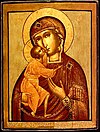Portal:Comparative religion
part of the School for Theology.
|
Comparative Religion

Current Learning Projects

The development of large scale projects for group learning and future pedagogical use is one of the goals of this school. Some of the ongoing learning projects are:
Comparative mythology/metaphysics
Creation
consciousness science
Eschatology (End of the world)
Judgment
Wheel of Rebirth
Comparative ethics
Laws of right conduct
- 10 Commandments (613 in total) of Judaism
- Sila of Buddhism
- Yama & Niyama of Yoga
- The 'Do what thou wilt shall be the whole of the Law' of Thelema
Department History
- The Department of Comparative Religion was founded within the Wikiversity's School of Theology on 28 February, 2008.
School news
- The Department of Comparative Religion was created at the request of discussion on the School of Theology talk page. It is not yet finished. Do you want to expand this ? from 28th February 2008
Related Schools
| Theology | History |
|---|---|
| Humanities | Social Sciences |
Selected Research Topics
Please feel free to add a topic or contribute your hunting and gathering time (see Hunter-gatherers_project) to expanding the resources in an existing one! Portal:Comparative religion/Topics
Quote

"Magick is the science and art of causing change to occur in conformity with will"
w:Aleister_Crowley, [1]
British Mystic (1875-1947 CE)
Self Paced Learning Program: Theology
The intent of this School is to offer a program, not unlike a degree program, in Comparative Religion. Given this objective, a series of courses are listed below so that students will be able to fulfill their goal of undertaking a comprehensive and university-style Undergraduate degree program. The program is structured over a hypothetical four-year period, in which a student takes ten classes per year. The core classes must be completed and should be augmented by selections from the electives. Strategic Studies is a multidisciplinary study. It is therefore encouraged that students select courses from other Schools that have application in light of the direction they wish to take their studies. Students taking a Christian focus should feel free to round out their general understanding of Christianity by taking dominantly Christian courses that perhaps have a relation to the student's ethnic areas of interest from School: Theology. Students wishing to emphasize religion from a socialogical standpoint in their studies are encouraged to take general courses from School: Religious Studies. Students may notice that Comparative Religion has a strong overlap with Theology, and Courses from that Department may make up part of a student's Course load.Guidelines: for definitions of Courses, Classes, and Projects, please see the Templates page. Students should complete ten Courses per "year." All Core Courses must be completed. The student may round out their Course load with appropriate Electives. Appropriate would imply that they come from the "year" in which the student is studying at that time. While there is nothing to stop you from taking courses in any order you wish, it is recommended that courses be taken in some semblance of order. Upon completion of the full degree program... pat yourself on the back. Education is its own reward.
Core Courses
First Year
- CORE 100 - Introduction to Comparative Religion
- CORE 110 - Introduction to Comparative Mythology
- CORE 120 - Comparative Axiology: Aesthetics & Ethics
- CORE 130 - Epistemology: Agnosticism or Gnosticism?
- CORE 140 - Introduction to Metaphysics: Cosmology & Ontology
- CORE 142 - Creation Myths Around The World
- CORE 150 - A Study in Eschatology
- CORE 152 - A Study on The Wheel of Rebirth
Second Year
- CORE 210 - Varieties and Unity of Theism
- CORE 256 - Worldwide Sacred Texts Temurah And Introduction to The Seven Keys
Third Year
Fourth Year
Elective Courses

Electives
First Year
- CORE 132 - Introduction to Alchemy
- CORE 150 - Introduction to Shamanism
- CORE 151 - Comparative Afterlifes
- CORE 154 - Introduction to Mysticism
- CORE 155 - The place of Allegory in Religion
- CORE 156 - Introduction to Esoterism
- CORE 160 - Esoteric Mysticism of The Pagan Religions
- CORE 170 - Esoteric Mysticism of The Great Religious Founders
- CORE 180 - Esoteric Mysticism of The Perennial Philosophers
Second Year
- CORE 260 - Comparative Gnosticism
Third Year
- CORE 360 - Comparative Yogas And Hermetism
Fourth Year
- CORE 450 - Advanced Theosophy




